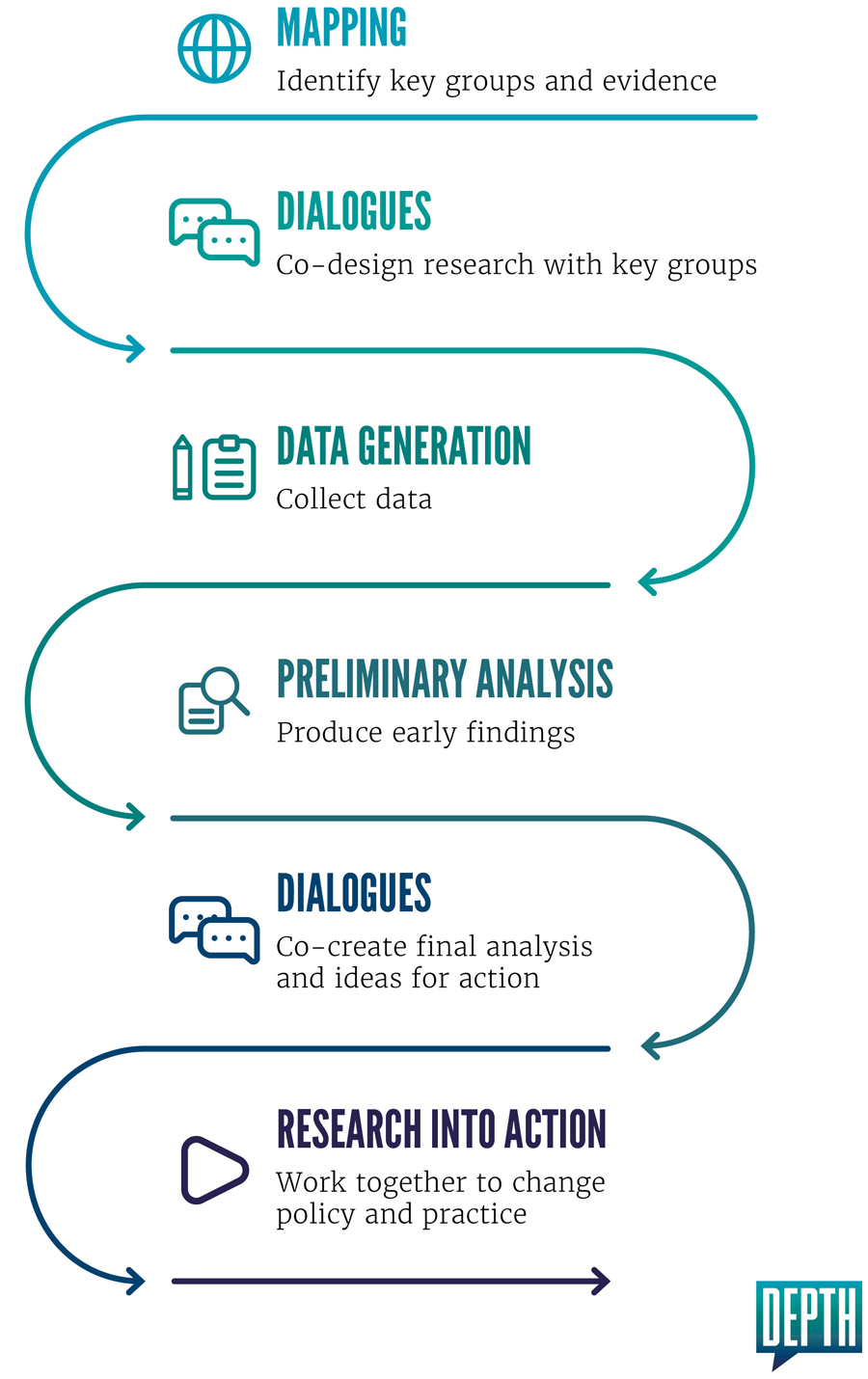Sex Workers Evaluate Reporting Violence (SWERV) is a 30-month, participatory, mixed-method project to evaluate how UK charity National Ugly Mugs’ services affect sex workers’ safety and mental health.
This project – with sex workers centrally involved in designing and carrying out the research – will develop a robust evidence-base to inform community-based violence prevention and survivor support services by and for sex workers, in the UK and internationally.
This research is a community-academic partnership with participatory methods at the heart of our work. This means that sex workers are centrally involved in designing and carrying out the research, as researchers, advisors, and via discussion workshops.
We will take the DEPTH approach which involves ‘dialogues’ (discussions) with sex workers and practitioners to co-develop the research design and recommendations.
Sex workers and services have developed ways to prevent violence and support survivors but we don’t know enough about what works best to improve sex workers’ safety and mental health. Some sex workers are vulnerable to violence, have unmet mental health needs and don’t have access to appropriate services. In addition to this, sex workers are often discriminated against by police and public services, and their reports of violence as well as their treatment needs are not adequately responded to.
The Sex Workers Evaluate Reporting Violence (SWERV) project is a research initiative between health researchers at the London School of Hygiene and Tropical Medicine (LSHTM) and National Ugly Mugs (NUM), in collaboration with Brunel University. Together, with the meaningful involvement of sex workers across the UK, we will evaluate how membership and engagement with NUM services affects sex workers’ safety, mental health and wellbeing.
NUM’s core violence prevention and support services include the processing of reports of harm against sex workers; the provision of victim support services (casework); and the dissemination of alerts to warn sex workers of dangerous people and conditions that pose a threat to their safety. The charity also curates the national database of violence harms against sex workers known as the ‘NUMChecker’. This tool allows sex workers to screen potential clients using email addresses, phone numbers, profile names and vehicle registrations, to determine if there is a match to a submitted report.
In this project, we will use participatory, mixed-methods, to evaluate how NUM’s services affect sex workers’ safety and mental health, with sex workers centrally involved in designing and carrying out the research.
We will study how NUM’s alerts, the NUMchecker, reporting and casework (‘interventions’) affect sex workers’ safety and mental health, through five work packages A-E. We will interview sex workers who have and who haven’t used NUM, and service providers, about their views and experiences of NUM’s services, to understand who benefits from the interventions, how and why (‘qualitative process evaluation’ – work package B). We will ask new NUM members, and sex workers who aren’t members, to fill in a questionnaire twice, six months apart. The questionnaire will ask about violence, safety strategies, and mental health, to compare the experiences of sex workers who do and don’t use the alerts and the NUMchecker (‘impact evaluation’ – work package C). We will estimate value for money, by calculating how much the interventions cost to run and comparing this to no intervention, in terms of preventing violence against sex workers and improving their quality of life (‘economic evaluation’ – work package D). We will use the information to understand how NUM’s services work in different places and for different people, depending on their circumstances and the wider environment, using ‘realist’ evaluation methods. We will also carry out a rapid review of published evidence on violence prevention and support services by and for sex workers (work package A).
We will take the ‘DEPTH’ approach which involves ‘dialogue’ workshops with sex workers and practitioners to design the research and recommendations together (work packages A and E). Together, we will use what we learn to recommend how to improve community-based violence prevention and survivor support services ‘by and for’ sex workers.
The project is led by Dr Pippa Grenfell and Professor Lucy Platt (London School of Hygiene and Tropical Medicine), with co-investigators Dr Raven Bowen (CEO of National Ugly Mugs), Dr Rachel Stuart (Brunel University), Professor Anna Vassall (LSHTM) and Professor Chris Bonell (LSHTM). We have expertise in service-delivery with sex workers, public health, social sciences, co-production, epidemiology, evaluation and economics, and strong links with sex-working communities.
The project will be hiring two part-time (4 days/week) Research Fellows at LSHTM and a part-time (2.5 days/week) Research Coordinator at National Ugly Mugs, as well as a team of freelance community co-researchers to help design and deliver the research. The project will be advised by a Steering group including community, practitioner, and academic members (some members may fulfil a combination of these roles). Provisional research sites include Glasgow, London, and Manchester.
This project is funded by the National Institute for Health and Social Care Research, for 30 months (NIHR156812). The views expressed are those of the research team and not necessarily those of the NIHR or the Department for Health and Social Care.
We are a multi-disciplinary team with expertise in working to improve health and welfare by, with and for people who sell sex.
Professor Lucy Platt is Professor of Public Health Epidemiology at LSHTM. She has expertise in quantitative and mixed-methods evaluations of complex interventions with sex workers and other marginalised populations, including in relation to violence and mental health. She will lead the impact evaluation, the rapid realist review and supervise the quantitative team (work packages A and C).
Dr Pippa Grenfell is Associate Professor in Public Health Sociology at LSHTM. She has expertise in qualitative, mixed-methods and participatory research, in collaboration with sex workers and other marginalised populations, in relation to violence, mental health, sexual and reproductive health and rights. She will lead the qualitative process evaluation, supervise the qualitative team and co-lead on participatory methods, including the DEPTH approach (work packages A, B and E).
Dr Raven Bowen is Chief Executive Officer of National Ugly Mugs. She has a PhD in sociology with expertise in qualitative, mixed-methods, participant-driven research and implementing health and safety services and interventions by, with and for sex workers. She will advise on acceptability and feasibility of research methods, analyses and interpretation, providing access to NUM’s operations, and supervise the research team at NUM.
Dr Rachel Stuart is a Lecturer in Criminology at Brunel University. She has expertise in community-led qualitative and mixed-methods research by and with sex workers and other marginalised populations, including in relation to changing landscapes of violence, service provision, mental health and criminalisation. She has strong links to the community and will support and co-lead the participatory approach (work packages A and E).
Professor Chris Bonell is Professor of Public Health and Sociology at LSHTM. He has expertise in qualitative and mixed-methods realist evaluation of complex public health interventions, including structural approaches to violence and bullying prevention, and mental health. He will advise on realist evaluation methodologies.
Dr Lorna Guinness is an Associate Professor in Health Economics at LSHTM. She has expertise in costing and economic evaluation of interventions for marginalised populations including sex workers. She will lead the economic evaluation until Dr Sedona Sweeney joins the SWERV! team in January 2025.
Dr Victoria Holt, Research Fellow at LSHTM, is an activist and academic based in Brighton. Her PhD explored sex workers' experiences of domestic abuse and was deeply informed by her years working in frontline harm reduction organisations. She has experience in qualitative methodologies, scholar-activism and community knowledge production. Victoria (Vee) will manage the dialogue workshops and the qualitative process evaluation, in collaboration with Pippa Grenfell and Rachel Stuart, and other colleagues at NUM and LSHTM.
Dr Claire Broad is a Research Fellow based at LSHTM. Her PhD explored the sexual health of brothel and street based sex workers in coastal, hard-to-reach towns of Ecuador. She is a quantitative researcher but has previous experience working within UK based sexual health clinics as both a healthcare assistant and researcher. She will be working as part of the quantitative team on the impact evaluation and realist review (work packages A and C).
Elizabeth Mc Guinness is a Research Coordinator based at NUM. She is an advocate and researcher at the intersections of human rights, mental health, gender, violence, disability, sexuality, and stigma. Her prior work has focused on rights-based transformation of (mental) health systems, as well as in scaling of psychological interventions demonstrating efficacy for violence survivors. She is passionate about transfusing the lived experience of her communities (as well as those whose struggles are interwoven) within epidemiological evidence, towards overhaul of carceral systems. Her work with SWERV! will span across Work Packages.
Denise Webb is a Project Coordinator within the Department of Public Health, Environments & Society at LSHTM. She manages a portfolio of research grants for projects centred around sexual health, health inequalities and the wellbeing of young people. She will work on maintaining the budget, financial reporting and adhering to funder requirements for the SWERV! project.
The participatory methodology we are using in this project is framed by the DEPTH approach, which uses dialogues with communities and practitioners to co-produce action-oriented health research (Marston et al, 2022). This approach provides a framework for involvement, engagement, and collaboration with diverse stakeholders, to co-produce robust, high-quality evidence and recommended actions.
DEPTH involves: mapping, to identify key groups and evidence; first dialogues (e.g. discussion workshops), to co-design the research with key groups; data generation and preliminary analysis; second dialogue workshops, to co-create final analysis and ideas for action; and research into action: working together to change policy and practice.
Our participatory approach involves recruiting community co-researchers and advisors with diverse lived experiences of sex work to join the study team and Steering group. These team members will contribute to designing, steering and delivering (collecting and analysing data, producing and disseminating outputs) the research.
NUM is a UK-based victim support charity for adults in sex industries. Its mandate is to ‘end all forms of violence against sex workers’. NUM was a pilot project of the former UK Network of Sex Work Projects that was founded in 2012. NUM’s core violence prevention and support services include the processing of reports of harm against sex workers; the provision of victim support services; and the dissemination of alerts to warn sex workers of dangerous people and conditions that pose a threat to their safety.
Today, NUM has over 9700 members, 85% of whom are active sex workers. Other members comprise venues, practitioner groups and front-line services. In 2023, NUM processed 585 reports containing 764 accounts of harm to sex workers. The organisation sent out 849,631 alerts last year to aid in violence prevention (via email and SMS texts), totalling 3.33 million alerts since inception.
The charity curates the national database of violence harms against sex workers known as the ‘NUMChecker’. This tool allows sex workers to screen potential clients using email addresses, phone numbers, profile names and vehicle registrations, to determine if there is a match to a submitted report.
NUM offers victim support case work by qualified Independent Sexual Violence Advisors. This victim support ranges from the development of safety plans; brief and emergency intervention; referrals to community/public services and police; access to vouchers, food and fuel banks; assistance to flee violence; and support from ‘report to court’ and beyond.
NUM advocates for non-judgemental, quality police responses to sex worker victimisation and provides eLearning and consultation to forces to improve the treatment of sex workers. NUM has recently developed vocational support services to assist those who desire to take breaks from sex work, blend it with other jobs, or leave it entirely. The Charity also runs a racial justice project to learn more about the experiences of racialised sex workers to improve services and advocate for the unique needs of this population. NUM’s education and advocacy are informed by lived experience, research, and practitioner know-how.



